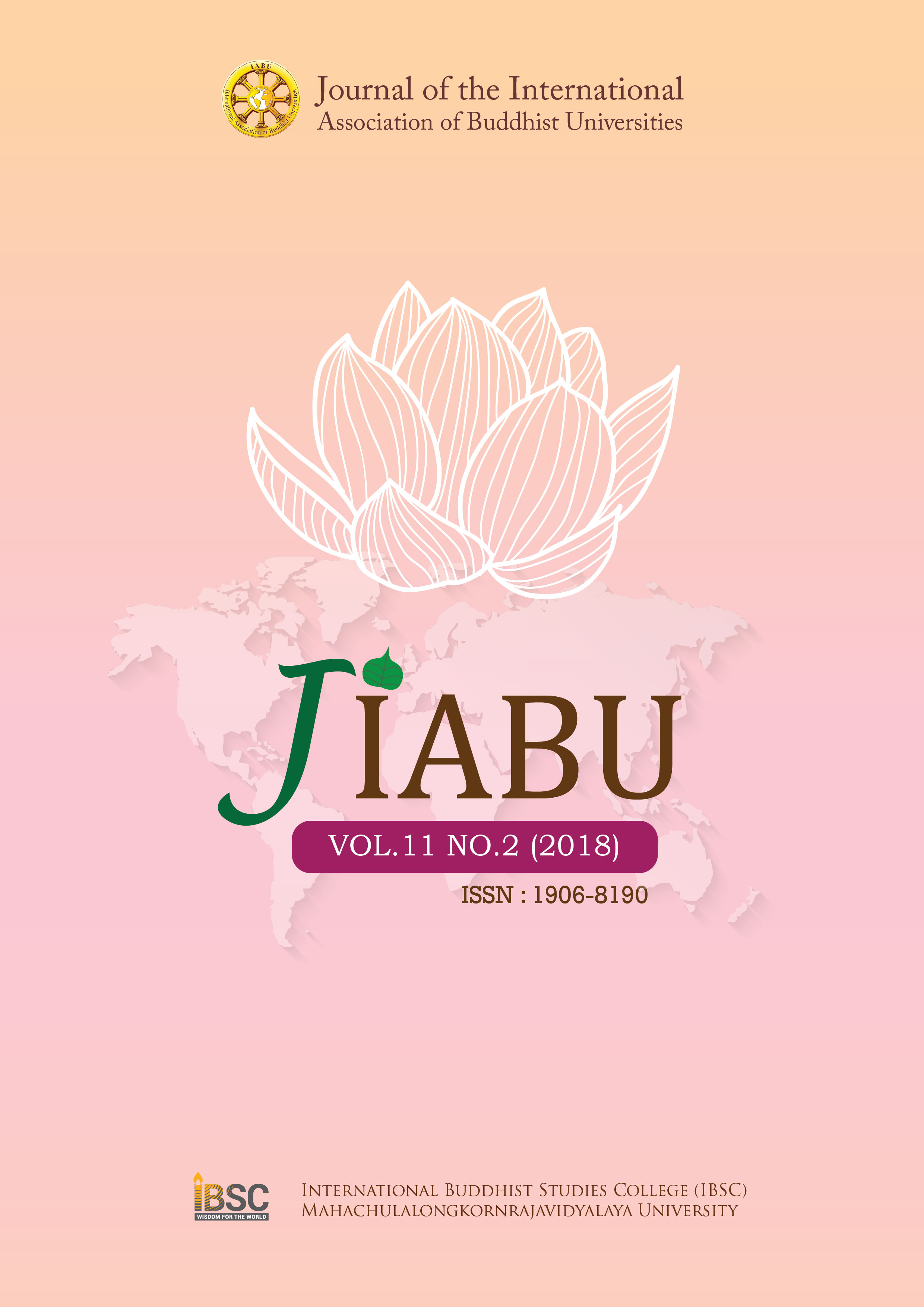Kathina Robe In Theravāda Tradition
Main Article Content
บทคัดย่อ
This paper takes a deep aim to discern the practical meanings and vital importance
of Kathina robe (cīvara) in Theravāda tradition. According to Vinayapiṭaka, Kathina practice
of early Saṅgha was just simple monastic acts and the monk who spread the Kathina and who
rejoiced in the Kathina are entitled to enjoy the five Kathina privileges (kathinānisaṃsa).
The characteristics of Kathina robe are offered to the Saṅgha (Saṅghikadāna) and the time to
offer the Kathina (Kāladāna). However, the Kathina robe was allowed by the Lord Buddha
for the convenience of the monks in their daily lives, mainly for their Dhamma tours and
used of robes.
Article Details
Views and opinions expressed in the articles published by The Journal of the International Association of Buddhist Universities (JIABU), are of responsibility by such authors but not the editors and do not necessarily reflect those of the editors.
เอกสารอ้างอิง
Oxford: PTS.
Chalmers, Robert (ed.). (1994). The Majjhima-Nikāya. Vol. III. Oxford: PTS.
Feer, M. Leon (ed.). (1998). The Saṃyutta-Nikāya. Part. I. Sagāthavagga. Oxford: PTS.
Hardy, E. (ed.). (1994). The Aṅguttara-Nikāya. Part III. Pañcakanipāta and Chakkanipāta.
London: PTS.
Hinuber, Von. O, Norman K.R. (eds.). (1995). Dhammapada. London: PTS.
Muller, Edward (ed.). (1979). The Atthasālinī – Buddhaghosa’s Commentary on the
Dhammasaṅgaṇī. London: PTS.
Norman, H.C. (ed.). (1993). The Commentary on the Dhammapada. Vol. I. Oxford: PTS.
Oldenberg, Hermann (ed.). (1997). The Vinaya Piṭakaṃ. Vol. I. The Mahāvagga. Oxford:
PTS.
. (1977). The Vinaya Piṭakaṃ. Vol. II. The Cullavagga. Oxford: PTS.
. (1993). The Vinaya Piṭakaṃ. Vol. III. The Suttavibhaṅga, First Part. (Pārājika,
Saṅghādisesa, Aniyata, Nissaggiya.). Oxford: PTS.
. (1993). The Vinaya Piṭakaṃ. Vol. IV. The Suttavibhaṅga, Second Part. (End of
the Mahāvibhaṅga, Bhikkhunīvibhaṅga.). Oxford: PTS.
Sāriputta, Thera. (1960). Sāratthadīpanī-Ṭīkā - A Commentary on Samantāpāsādikā of
Buddhaghosa. India: Vipassana Research Institute.
Stede, W. (ed.). (1971). Sumaṅgalavilāsinī – Buddhaghosa’s Commentary on the DīghaNikāya. Part II. London: PTS.
Takakusu, J; Nagai, Makoto (eds.). (1975). Samantapāsādikā – Buddhaghosa’s Commentary
on the Vinaya Piṭaka. Vol. I. London: PTS.
. (1982). Samantapāsādikā – Buddhaghosa’s Commentary on the Vinaya Piṭaka.
Vol. VI. London: PTS, 1982.
Bodhi, Bhikkhu (tr.). (1995). The Middle Length Discourses of the Buddha: A Translation
of the Majjhima Nikāya. USA: Wisdom Publication.
. (2000). The Connected Discourses of the Buddha: A New Translation of the
Saṃyutta Nikāya. Vol. I. Boston: Wisdom Publications.
. (2012). The Numerical Discourses of the Buddha: A Translation of the Aṅguttara
Nikāya. Boston: Wisdom Publications.
Buddhaghosa. (1920). The Expositor (Atthasālinī) - Buddhaghosa’s Commentary on the
Dhammasaṅgaṇī. tr. by Muang Tin. London: Oxford University Press.
Burlingame, Eugene Watson. (1921). Buddhist Legends: Translated from the Original Pāli Text
of the Dhammapada Commentary. Vol. II. Cambridge: Harvard University Press.
I.B. Horner (tr.). (1949). The Book of the Discipline (Vinaya-Piṭaka). Vol. II (Suttavibhaṅga).
London: Luzac & Company Ltd.
. (1969). The Book of the Discipline (Vinaya-Piṭaka). Vol. III (Suttavibhaṅga).
London: Luzac & Company Ltd.
. (2000). The Book of the Discipline (Vinayapiṭaka). Vol. IV (Mahāvagga) London:
PTS.
. (1963). The Book of the Discipline (Vinaya-Piṭaka). Vol. V (Cullavagga). London:
Luzac & Company Ltd.
Max Müller, Friedrich (tr.). (1898). The Dhammapada: A Collection of Verses. 2nd Ed.
Oxford: The Clarendon Press.
T.W. Rhys Davids, William Steden (eds.). (1952). Pāli - English Dictionary, London:
PTS.
Jonathan S. Walters, (tr.). (2017). Legends of the Buddhist Saints, USA: Jonathan S. Walters
and Whitman College.


